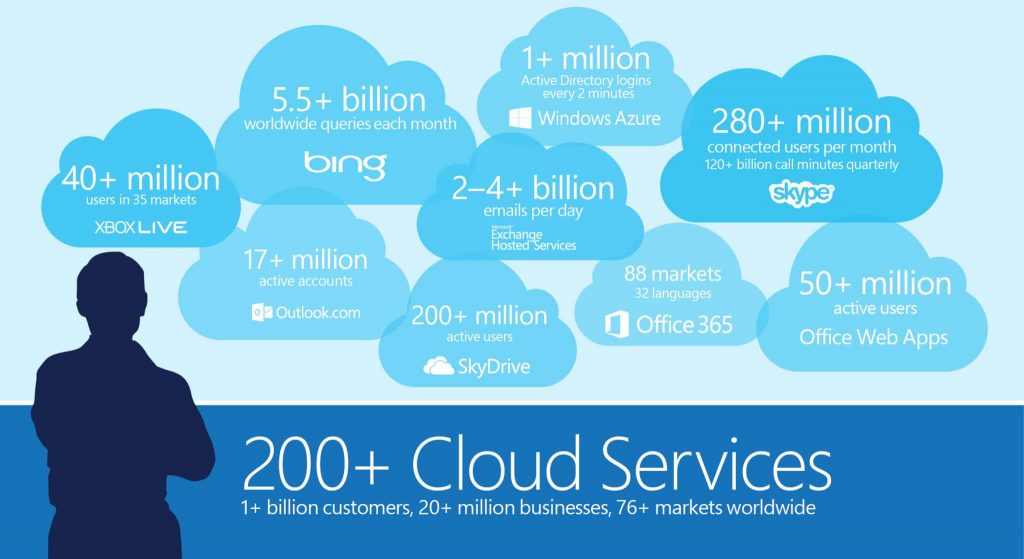 Microsoft’s cloud computing platform Azure, launched in February 2010. It is an open and flexible platform used for building, testing, deploying, and managing virtual machines, object storage, and content delivery networks (CDNs) through a global network of Microsoft-managed data centers in 42 regions around the world and includes open-source, standards-based technologies and proprietary solutions from Microsoft. According to Synergy Research Group, the market is growing rapidly (cloud sales are at $7.9 billion – 17% growth over the year before) and Azure is currently the second biggest cloud provider with 13% of the market, behind Amazon at 33%. It services include Software as a Service (SaaS), Platform as a Service (PaaS) and Infrastructure as a Service (IaaS) and supports numerous programming languages, tools and frameworks. The advantage of using cloud services like Azure is that there are no upfront costs for physical hardware, that Azure services are scalable and you can instantly provision computing resources on demand. Azure’s billing structure is the pay-as-you-go model; based on resources used such as CPU, storage, and consumption, which is similar to Amazon Web Services.
Microsoft’s cloud computing platform Azure, launched in February 2010. It is an open and flexible platform used for building, testing, deploying, and managing virtual machines, object storage, and content delivery networks (CDNs) through a global network of Microsoft-managed data centers in 42 regions around the world and includes open-source, standards-based technologies and proprietary solutions from Microsoft. According to Synergy Research Group, the market is growing rapidly (cloud sales are at $7.9 billion – 17% growth over the year before) and Azure is currently the second biggest cloud provider with 13% of the market, behind Amazon at 33%. It services include Software as a Service (SaaS), Platform as a Service (PaaS) and Infrastructure as a Service (IaaS) and supports numerous programming languages, tools and frameworks. The advantage of using cloud services like Azure is that there are no upfront costs for physical hardware, that Azure services are scalable and you can instantly provision computing resources on demand. Azure’s billing structure is the pay-as-you-go model; based on resources used such as CPU, storage, and consumption, which is similar to Amazon Web Services. Here is a list of some of the more important services that Azure has to offer:
Azure Benefits:

Azure Questions and Answers
Q: “I’m hesitant to move to cloud IaaS because my business is beholden to several compliance mandates.”
A: Microsoft Azure has the most comprehensive list of compliance certifications of any hyper-scale cloud provider. Azure also has industry-leading capabilities to meet the needs of key compliance requirements. Please visit the Microsoft Trust Center to get a full list of Azure’s certifications and attestations.
Q: “I don’t want to increase security risks by migrating to the public cloud.”
A: As a hyper-scale provider, Microsoft can make greater security investments than the majority of companies in the industry. By incorporating automation and machine learning capabilities into the core, Azure is continuously improving its ability to detect, isolate, and remediate potential threats. Moreover, Microsoft adheres to strict industry standards for security and is constantly tested and audited by 3rd party entities. Learn more at the Azure Security Center.
Q: “I don’t want to lose control of my company’s sensitive corporate and application data by moving to the cloud.”
A: With Azure, you have ownership of your data—that is, all data, including text, sound, video, or image files and software, that are provided to Microsoft by you, or on your behalf, through the use of Azure. You can access your data at any time and for any reason without assistance from Microsoft. Microsoft does not use customer data or derive information from it for advertising or data mining.
 Q: “I’m worried about the cost of transitioning to a new service delivery model. Won’t these new investments increase my overall operating costs?”
Q: “I’m worried about the cost of transitioning to a new service delivery model. Won’t these new investments increase my overall operating costs?”

Keith Heilveil

Sr. Director of Sales, PMP